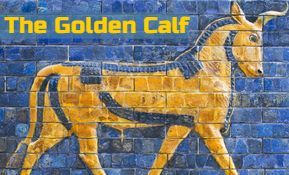
Behar-Bechukotai: In God We Trust
Most college professors are not big fans of the Torah and its commandments, but there is one mitzvah - Shmittah - that the Torah introduced to the...

Superman
Most college professors are not big fans of the Torah and its commandments, but there is one mitzvah the Torah introduced to the world that they are truly grateful for — the Sabbatical Year, which is discussed at length in Parshat Behar:
“But in the seventh year, the land shall have a complete rest, a Shabbat to Hashem; you shall not sow your field, nor shall you prune your vineyard” (Vayikra 25:4).
During the seventh year, the Shemitah Year, plowing, planting or harvesting is prohibited. The fruits growing on the trees are declared ownerless and made available to anyone who wishes to partake of them. It is analogous to the observance of the Shabbat in that it is considered a "Year of Rest" for the Land and for society. All business debts are cancelled.
It is also a test of faith for the Jewish farmer who has to rely on the produce of the sixth year to tide him and his family over through the sixth year, throughout the entire seventh year and until at least Nisan of the eighth year, when the winter wheat will have grown.
The Midrash cites a verse in conjunction to the mitzvah of Shemitah: “Bless Hashem, O His angels; the strong warriors who do His bidding, to obey the voice of His word” (Tehillim 103:20).
“Rabbi Yitzchak Nafcha says: These are the ones who observe the mitzvah of the Seventh Year. Usually, a mitzvah lasts for a day, a week, or a month, but where do we find a mitzvah that lasts an entire year? The farmer sees his field lying fallow and his vineyard abandoned, and keeps quiet. Is there a mighty warrior greater than this?” (Yalkut Tehillim 103).
In Sichot Mussar, Rabbi Chaim Shmuelevitz explains that the intent of the Midrash is to demonstrate the power of a human being who is successful in overcoming his urges. Normally, someone could resist his temptations for a day or two, and with real willpower for a week or a month. But how can a person watch as his fields lie fallow and people enter his orchards and vineyards to help themselves to the fruits of his labor? For an entire year he watches as people take the fruit from the trees he nurtured. He watches and remains quiet. This is superhuman!
Our decisions and resolutions normally crumble and fade away. How do those who keep Shemitah keep their commitment for an entire year? The Midrash is telling us they are “His angels, the strong warriors who do His bidding.” Their might is supernatural, the stuff of which angels are made.
The Might of Angels
The Sages teach (Shabbat 88a) that when God heard Israel proclaim: “We will do and we will obey” (Shemot 24:7), He exclaimed: “Who revealed this secret to My children, the secret that the ministering angels use for themselves, as it says: ‘Bless Hashem, O His angels; the strong warriors who do His bidding, to obey the voice of His word’ (Tehillim 103:20)?” The angels have the same order of priorities, first they “do” and then they “obey.”
The proclamation “We will do and we will obey” is the source of Israel’s strength. It is the spiritual might of the angels who totally submit themselves to God’s Will, and it was the secret that brought the Jewish people to accept the Torah at Mount Sinai. Mortal man is not psychologically prepared to commit himself to do and obey when he has not yet heard what is expected of him; this is the preparedness of angels alone. Yet Israel achieved this exalted level at the time of the Giving of the Torah.
Those that observe the Shemitah share this strength as well. They do not ask: “What will we eat?” “We will do” precedes “we will obey,” like the mighty warriors upon whom the yetzer hara holds no sway.
The mitzvah of Shemitah is for every generation and not just for the earlier generations “who resembled angels” or for a few select individuals. This demonstrates the high regard the Creator has for His people. An entire nation of farmers, truck drivers, grocers, and patrons of the open markets are called upon to keep the mitzvah, a mitzvah that requires the strength of heavenly angels.
The Consequences
We could easily think that since it takes such a high level of resolve and strength to keep Shemitah, God would be lenient if the Jewish people were remiss and the consequences of not keeping it would be light.
However, the mitzvah of Shemitah does not serve to provide mere “icing on the cake” in the spiritual life of the people. The Torah exhorts us (Parshat Bechukotai): “Then, the Land will be appeased regarding its sabbaticals. During all the days that it remains desolate while you are in the land of your enemies, the Land will rest and thus appease its sabbaticals. It will rest during all the days that it remains desolate, whatever it had not rested on your sabbaticals, when you lived upon it” (Vayikra 26:34-35). The Jewish people were exiled for not observing the Sabbatical year!
Rabbi Shmuelevitz explains that this is because the mitzvah of Shemitah depends on an all-important fundamental concept in Judaism — bitachon, trust in God. The Sabbatical Year calls for the entire nation to live an entire year without the material foundation necessary for a natural, ordinary life. They must cast aside all worry and rely completely on God, and this year is meant to implant the attribute of bitachon, trust in God, firmly in their hearts. The flame of bitachon will burn until the next Shemitah, seven years later. This attribute is an absolute necessity for God’s people, and therefore the Torah exhorts us so severely concerning Shemitah, “And if you should say, ‘What will we eat in the seventh year? We will not sow, and we will not gather in our produce!’ Know then, that I will command My blessing for you in the sixth year, and it will yield produce for three years” (Vayikra 25:20-21).
The Kli Yakar explains that this blessing is not referring to a physical abundance of produce in the sixth year. God’s promise is: “It will yield produce for three years” — the yield of the sixth year will have a special blessing of satiation. He will eat a little bit and be completely satiated as if he ate a lot, and the yield will last for three years.
[We find a similar concept in Parshat Bechukotai: “Your threshing will last until the vintage, and the vintage will last until the sowing; you will eat your food to satiety, and you will live in security in your land” (Vayikra 26:5). Rashi explains: “You will eat your food to satiety” — “One will eat only a little food, but it will become blessed in one’s innards.”]
This explanation from the Kli Yakar implies that the Jewish people are being asked to rise to a high level of bitachon. We are expected to look at the measurement of grain that would suffice for one year and expect it to last for three years, and on the basis of that trust we will not sow, plow, or harvest our produce for an entire year. When the Jewish people did not attain this lofty height of faith and trust in God, the Holy Temple in Jerusalem was destroyed and we were exiled from our Land.
Simple Faith
A simple baal agalah, wagon driver once heard the Alshich HaKadosh speak about how, if a person has pure bitachon, trust in God, Hashem will provide for him without him having to lift a finger. The wagon driver thought, “Since that's the case, I'm crazy for working so hard!” He decided to quit his job and rely completely on Hashem.
The wagon driver spent his days reciting Tehillim while his wife and children were frantic with worry. "I heard from the Alshich," he explained to them, "that if a person really trusts in Hashem, Hashem will send that person everything he needs without him having to go out to work. Why should I kill myself to bring something that will come on its own?" And with that, he calmly returned to his Tehillim.
The wagon driver sold his horse and wagon to a gentile neighbor, who took it to an area where he was digging and discovered a large stash of gold. He quickly filled some old sacks that he had in the wagon with the gold and returned home. But on his way home a large rock fell on him, killing him immediately. His hungry horse returned to its former owner and appeared at the wagon driver's house just as the wagon driver calmly looked up from his Tehillim.
The Alshich's students asked their Rebbe how this simple wagon driver had succeeded with his faith while they had all failed. The Alshich explained that the wagon driver had accepted the truth as a plain and simple fact. "You, on the other hand," he said, "had worries and concerns. You didn't believe in the power of your bitachon.” (Story from Rabbi Yisroel Ciner and Project Genesis).
Rabbi Shmuelevitz adds that even according to the opinions that disagree with the Alshich and maintain that we must make an effort in conjunction with our bitachon; this does not mean it is our efforts that make us successful. Everything comes from God, especially one’s livelihood, and we are required to make efforts only because of the curse: “By the sweat of your brow shall you eat bread” (Bereishit 3:19).
The Torah ends the Book of Vayikra with the parshiyot of Behar and Bechukotai, which relate the mitzvah of Shemitah and the awesome consequences of ignoring it. The Torah calls upon God’s people to be mighty warriors and rise to the sublime level of trust in the One Above.
This coming year will be a Shemitah year. May we be privileged to fulfill all the details of this mitzvah in a state of kedushah and purity before Hashem, in Hashem's Holy Land, as we ascend to the final Beit HaMikdash, constructed by Hashem Himself.











Tell us what you think!
Thank you for your comment!
It will be published after approval by the Editor.